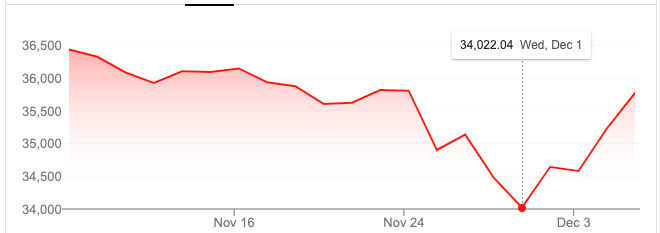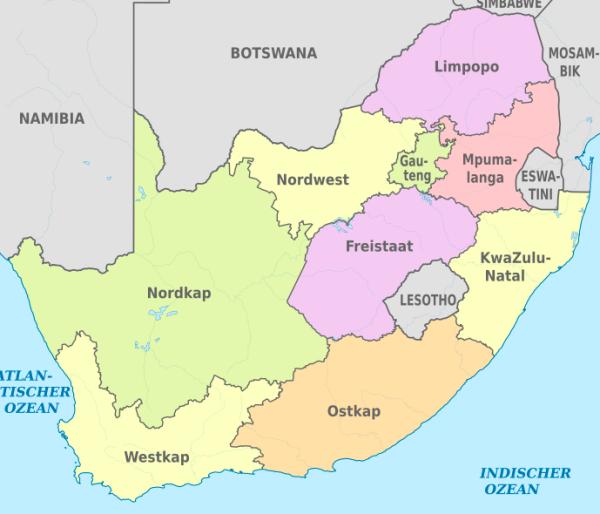Consider these recent headlines and imagine how they were interpreted by casual news followers.
USA Today: What to know about omicron, the new COVID-19 variant in South Africa
CNN: South Africans brace for the worst amid Omicron surge
STAT: What’s known and unknown about Omicron, the coronavirus variant identified in South Africa
ABC News: What is this new COVID variant in South Africa?
Bloomberg: Your Evening Briefing: South African Coronavirus Variant Sparks Concern
There are plenty more like this, all giving the impression that South Africa is some kind of festering "viral leper colony" or, perhaps, the location of a secret bioweapons research facility. Even though the latest variant scare was named omicron, (1) when the press referred to the new variant, with few exceptions, the words "originated in South Africa" were mentioned. This statement is misleading, irrelevant, and possibly even wrong. And utterly unfair to South Africa.
What really happened was that South African scientists were far ahead of the game, so much so that they identified and determined the omicron sequence with uncanny speed and accuracy, well before anyone else. Had they not done so it may well be that the origin of omicron would have either not been known or attributed to another country (as if it matters). But in today's insane world perhaps we need a new aphorism: "no good science goes unpunished," because, as you'll see, South African scientists did such a fine job that the country became an outcast and was stuck with the name "South African Variant."
This had plenty of South Africans severely pissed off. Here's one of them [emphasis added]:
"The problem with this near-global knee-jerk reaction to South Africa after the announcement of the Omicron variant, is that it will likely affect how these situations are handled in future. Because of the sudden travel bans, the South African tourism industry lost over R1 Billion in a matter of days due to canceled bookings, that’s not something any country would excitedly volunteer for. But this is just a symptom of a much bigger problem, the one where the worlds of science, politics, the media and the average citizen just seem to keep missing each other. If we don’t start fixing that, then we might as well down tools now and accept any ridiculous, unfounded and unscientific policy that gets thrown our way."
Elriza Theron, Director of communications in the South African plant science industry
Ms. Theron's astute quote should be a lesson for the media: sloppy, inaccurate reporting has consequences; in this case a ridiculous travel ban and a punch to the gut for an entire country that it surely did not deserve. Here's what really happened. The story can be found on the Netwerk24 news site. Unfortunately, it begins like this.
Hoe SA wetenskaplikes die Omikron-variant ontdek het
That odd-looking headline is written in Afrikaans, one of 11 official languages (2) of South Africa – 11 more than I even heard of before. Although Google Translator works pretty well for Afrikaans, Ms. Theron kindly translated the article for me.
Here's the story of how some very sharp scientists who, in doing their job (and then some) brought a thoroughly undeserved s### storm down on South Africa.
On November 19th, Dr. Raquel Viana, a Senior Medical Scientist at Lancet Laboratories and BARC-SA was sequencing Covid samples when she found eight samples with an unusually high number of mutations in the spike protein, which is responsible for binding the virus to host cell receptors. Her findings were so unexpected and disturbing that, at first, she didn't even believe her own results:
"I was shocked by what I saw in front of me. At first, I thought something had gone wrong in the process, but I soon realized that the samples were going to have huge consequences."
Raquel Viana, Ph.D. in an interview with Reuter
Viana was so troubled that she immediately called Daniel Amoako, a colleague at the National Institute of Communicable Diseases, also an expert in gene sequencing. Even though Amoako found the same genetic sequence in the eight samples, he was surprised, so much so that he didn't believe either Viana's results or his own. This changed quickly. Four days after the sequence of the viral genome was solved an additional 32 samples contained the same mutations; a new, highly contagious variant was "born" – just about the last thing the world needed.
No Good Deed
Once the sequence of the new variant was confirmed the scientists promptly did exactly what they were supposed to do:
- Notified the South African National Department of Health
-
Entered the variant sequence data into the Global Initiative on Sharing All Influenza Database (GISAID)
-
In doing so they discovered that on the same day Covid cases with the same sequence were also reported in Hong Kong and Botswana. So much for closing the borders. (3)
-
Viana reported that two-thirds of the Covid cases in the Gauteng province were caused by what would later be named omicron.
-
The Department of Health notified WHO on November 24th.
-
The press went to work and it was...
Panic Time
Thanks, in no small part to media hysteria, reaction to omicron was swift and extreme. For starters, the stock market reacted as you'd expect and then recovered, also as you'd expect.

Dow Jones closing prices after the omicron announcement.
- After a November 25th press conference when the South African Medical Association, announced its findings on the new variant all flights from South Africa and its neighbors were canceled.
- Western Europe went ballistic. There was a renewed discussion of new lockdowns and mask mandates.
- The leading CNN story on December 1st was: "First confirmed US case of Omicron coronavirus variant detected in California." As if this were a gigantic surprise? Did we think that a gigantic can of Lysol would be carried around on a drone and blast the whole US?
"Explosion of effects is what this phenomenon is called, a situation so complex that one is unable to easily tell the effects of the pandemic itself from those triggered by the responses to it."
Randy David, Inquirer.net, 12/5/21
Redemption
On November 26th USA Today published an opinion piece with a decidedly different message:
"South Africa is paying price for excellence in detecting omicron with discrimination"
On November 28th BBC News nailed it: "
"Covid: South Africa 'punished' for detecting new Omicron variant"
On December 4th CNN published "Anger simmers over Omicron travel bans in southern Africa" about how people in Southern Africa were furious (4) because of the travel bans and also this:
"There is no escaping that there is a fear of viruses that exist in Africa. It conjures up all sorts of terrible images in people's minds about Ebola-like catastrophes."
Remi Adekoya, a political analyst and lecturer at the University of York in a CNN interview
I can say with absolute certainty that if omicron was first detected in Great Britain, the US, or France there would be no harmful stigmatization of any of them. Just something to think about.
In the end, South Africa came out of this looking pretty good, perhaps enough so to stave off any reflexive and unfair criticism or worldwide dumb response should another variant be discovered there. But plenty of damage was done. No good science...
NOTES:
(1) The WHO decided on the Greek lettering system to avoid stigmatizing countries where a variant was discovered. That didn't work out so well, did it? And they also skipped two Greek letters, xi and nu, going from mu to omicron. Their explanation is pretty lame.
(2) Eleven languages? Seriously? Can you imagine what the equivalent of an "English" class in school must be like? And they love rugby. Strange folks, indeed.
(3) Some say that shutting borders is like "closing the barn door after the horse escapes." I maintain that the horse was never in the barn in the first place.
(4) It is not clear whether CNN spoke with Ms. Theron at this time or they were terrified to approach her. Could have been either.




